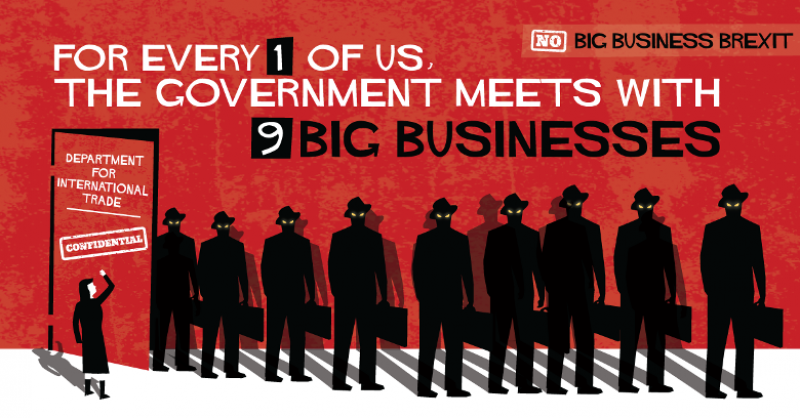
Business bias in secretive UK-US trade talks - blueprint for post-Brexit UK-EU trade negotiations?
Of UK trade department's 318 lobby meetings during 6 months, 90% were with business lobbies
British MPs not allowed any information about UK Trade Secretary Liam Fox’s closed-door talks with US
16 UK and US trade unions and civil society organisations call for trade talks to “be led by public input and take place in the light of day”
Is this a foretaste of a 'Big Business Britain' in the making post-Brexit?
Download the briefing.
UK trade secretary Liam Fox has come under fire for the strong business bias of his Department for International Trade's lobby meetings, as he launches unofficial trade negotiations with the US today. This bias also raises questions about the way a possible post-Brexit UK-EU trade deal might be skewed in the interest of Big Business.
A new briefing, Big Business Britain - How corporate lobbyists are dominating meetings with trade ministers, published by Global Justice Now and Corporate Europe Observatory, reveals the extent to which ministers at the UK Department for International Trade (DIT) are “overwhelmingly prioritising meeting with lobbyists from big business over all other interests.”
The analysis of official meeting records reveals that nine out of ten DIT lobby meetings between October 2016 and March 2017 were with business. This includes 8 meetings with HSBC, 6 with Barclays Bank, and 7 with oil giant BP, while public institutions, trade unions, civil society groups and even pro-business think tanks accounted for less than 10% of all meetings.
Ministers have refused to answer basic parliamentary questions as to the nature of the trade negotiations, including information on who is invited, what is on the agenda and where the talks are taking place. These details have also been judged to be beyond the reach of Freedom of Information requests.
Corporate Europe Observatory's transparency campaigner Vicky Cann said: “Trade has a profound impact on nearly all aspects of our daily life. So when the Department for International Trade is almost exclusively meeting business representatives, it limits the opportunities for all other sectors of society to be heard. It is obvious that the sort of trade deals they will come up with are highly unlikely to benefit society at large.
"Trade deals with such a business bias risk to strip away vital social, environmental and public health protections and hollow out democratic decision making, giving corporations the powers to sue governments for regulations they do not agree with.”
Global Justice Now’s director Nick Dearden said: “Trade deals today are not just about tariffs but public services, government purchasing, regulations, protections and standards. This is stuff that can’t be discussed in secret – it needs open debate and accountability. The DIT's secrecy combined with its massive bias towards big business paves teh way for a deregulated Britain that is run in the interests of multinational corporations. This would be a disaster for workers' rights, consumer standards and the NHS.”
In an open letter, 16 trade union and civil society groups from both sides of the Atlantic underscore that, “corporate lobbies are already seizing on the coming US-UK talks to push an agenda of financial deregulation, privatisation of public services, [...] and expansion of unaccountable trade tribunals.”
The DIT has rejected a Freedom of Information request seeking to glean any information about the timeline or locations of scheduled meetings for its ten working groups that bring together representatives from the UK trade department and fifteen other countries to scope out future trade deals for the post-Brexit period.
